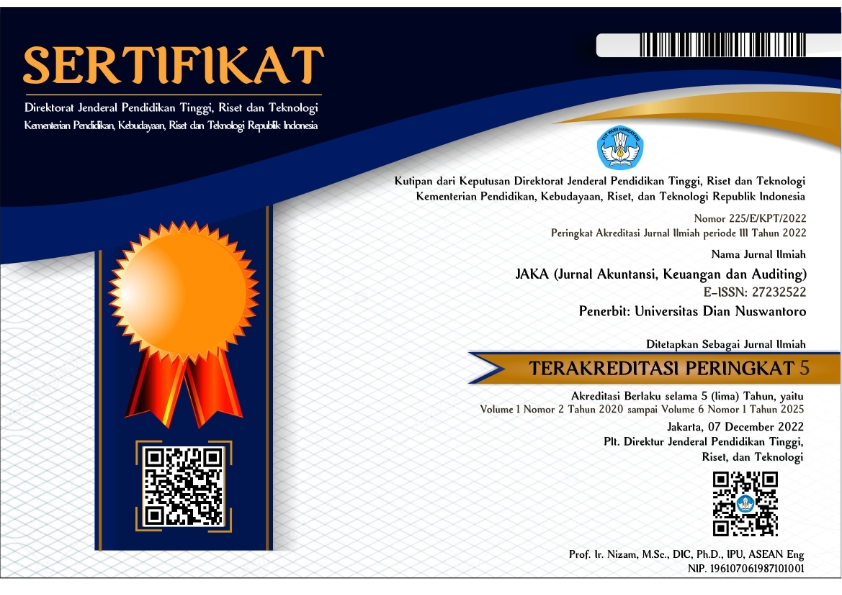RELIGIOSITAS, KEADILAN PROSEDURAL, KEPERCAYAAN KEPADA OTORITAS PAJAK, DAN KEPATUHAN PAJAK SUKARELA
DOI:
https://doi.org/10.56696/jaka.v1i2.4279Abstract
ABSTRACTThis research aims to develop the tax compliance model that has been studied in Indonesia. Compliance observed is voluntary tax compliance based on religiosity. The second objective is to confirm the inconsistency of previous research. Previous research on religiosity and procedural justice has inconsistent results, so it is important to confirm. Based on the theory of slippery slope model, this study has the presumption that the inconsistency of the results of previous studies on psychological-social variables (religiosity and procedural justice) can be explained by the mediating variable (trust in the tax authority). Data in this study were collected by surveying questionnaires on 100 individual taxpayers in Semarang city to analyze the role of religiosity, procedural justice and trust in the tax authority in increasing voluntary tax compliance. The results of the study indicate that the hypothesis of the trust to the tax authority can mediate the effect of religiosity and procedural justice variable on voluntary tax compliance can be accepted. This study concludes that trust in the tax authority is an important variable in mediating the effect of religiosity and procedural justice on voluntary tax compliance. This result also explains the inconsistency of previous research that distrust of the tax authorities causes high religiosity or high procedural justice not to be followed by voluntary tax compliance. Keywords: religiosity; procedural justice; trust in the tax authority; voluntary tax compliance. ABSTRAK Penelitian ini bertujuan untuk lebih dalam lagi mengembangkan model kepatuhan pajak yang selama ini diteliti di Indonesia. Kepatuhan yang diteliti adalah kepatuhan pajak sukarela berbasis religiositas. Tujuan kedua adalah mengkonfirmasi ketidakkonsistenan penelitian terdahulu. Penelitian terdahulu mengenai religiositas dan keadilan prosedural memiliki hasil yang tidak konsisten, sehingga penting untuk dikonfirmasi. Berdasarkan teori slippery slope, penelitian ini memiliki dugaan bahwa ketidakkonsistenan hasil penelitian sebelumnya pada variabel psikologi-sosial (religiositas dan keadilan prosedural) dapat dijelaskan oleh variabel mediasi kepercayaan kepada otoritas pajak. Data dalam penelitian ini dikumpulkan dengan melakukan survei kuesioner pada 100 orang wajib pajak orang pribadi di Kota Semarang guna menganalisis peran variabel religiositas, keadilan prosedural dan kepercayaan kepada otoritas pajak dalam meningkatkan kepatuhan pajak sukarela. Hasil penelitian menunjukkan bahwa hipotesis variabel kepercayaan kepada otoritas pajak dapat memediasi pengaruh variabel religiositas dan keadilan prosedural terhadap kepatuhan pajak sukarela dapat diterima. Penelitian ini menghasilkan kesimpulan bahwa kepercayaan kepada otoritas pajak merupakan variabel penting dalam memediasi pengaruh religiositas dan keadilan prosedural terhadap kepatuhan pajak sukarela. Hasil ini sekaligus menjelaskan ketidakkonsistenan penelitian terdahulu adalah karena ketidakpercayaan kepada otoritas pajak menyebabkan religiositas atau keadilan prosedural yang tinggi tidak diikuti oleh kepatuhan pajak sukarela. Kata Kunci: religiositas; keadilan prosedural; kepercayaan kepada otoritas pajak; kepatuhan pajak sukarela.Downloads
Published
2020-12-10
How to Cite
Sholih, M. W., Chariri, A., & Ubaidillah, M. (2020). RELIGIOSITAS, KEADILAN PROSEDURAL, KEPERCAYAAN KEPADA OTORITAS PAJAK, DAN KEPATUHAN PAJAK SUKARELA. JAKA (Jurnal Akuntansi, Keuangan, Dan Auditing), 1(2). https://doi.org/10.56696/jaka.v1i2.4279
Issue
Section
Articles
License
Copyright (c) 2020 JAKA (Jurnal Akuntansi, Keuangan, dan Auditing)

This work is licensed under a Creative Commons Attribution-ShareAlike 4.0 International License.













